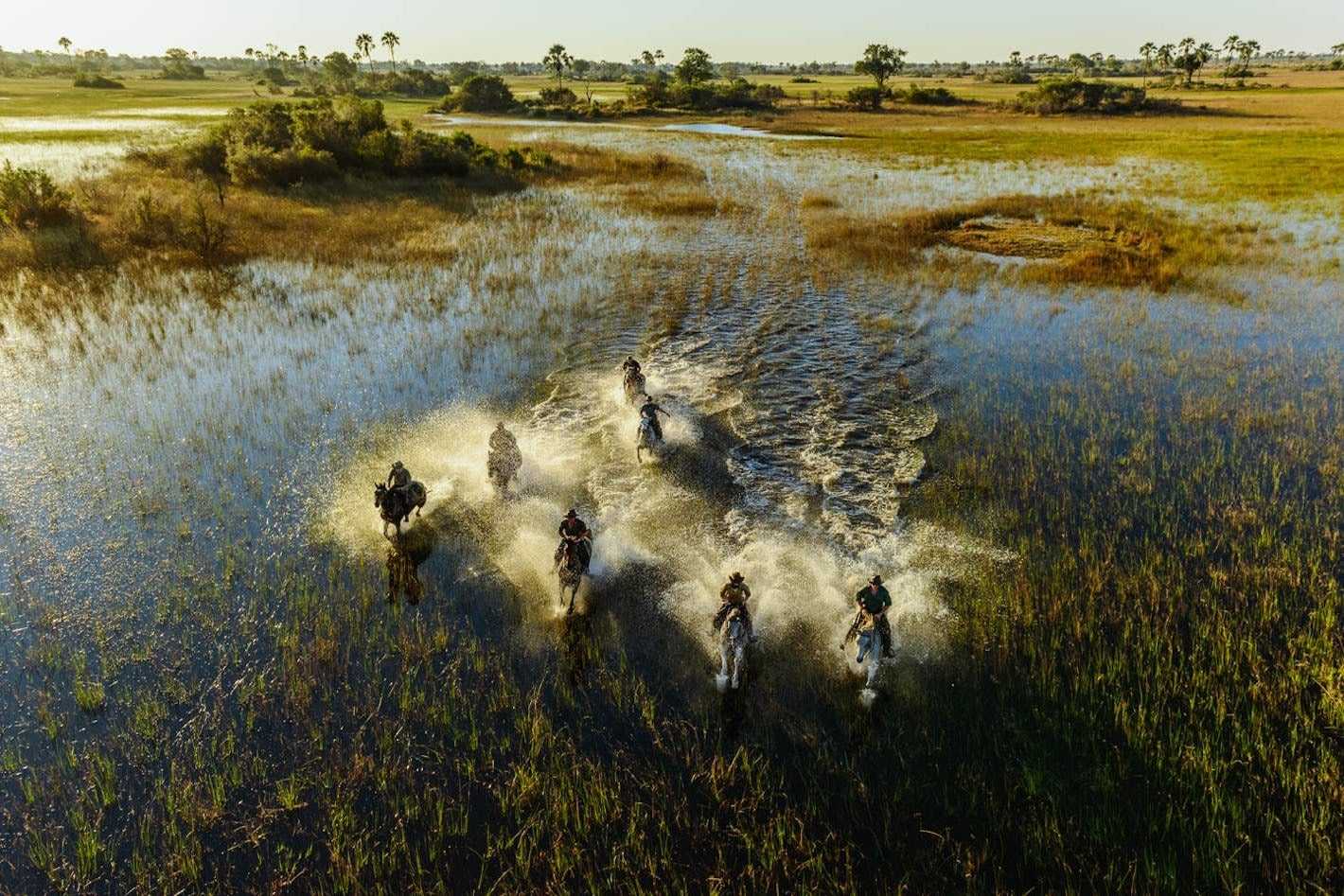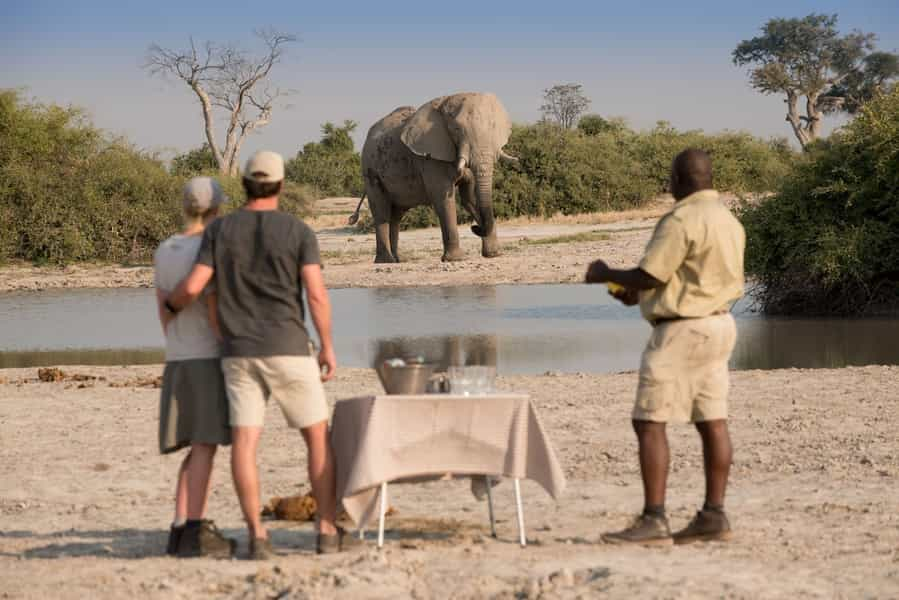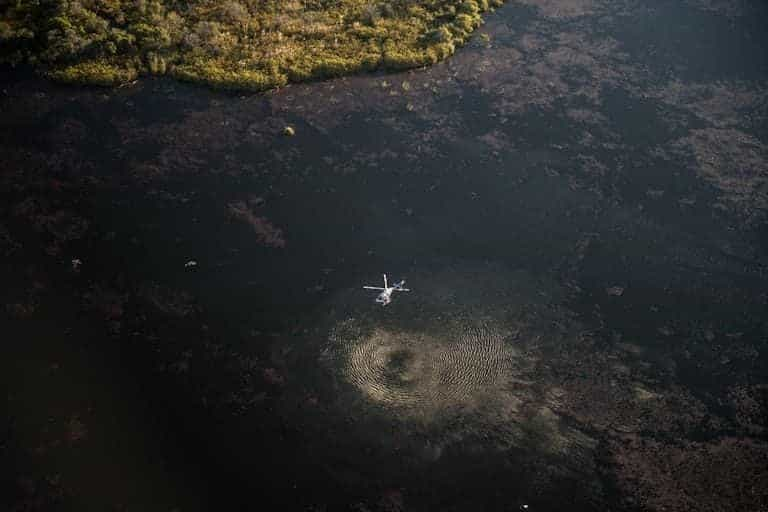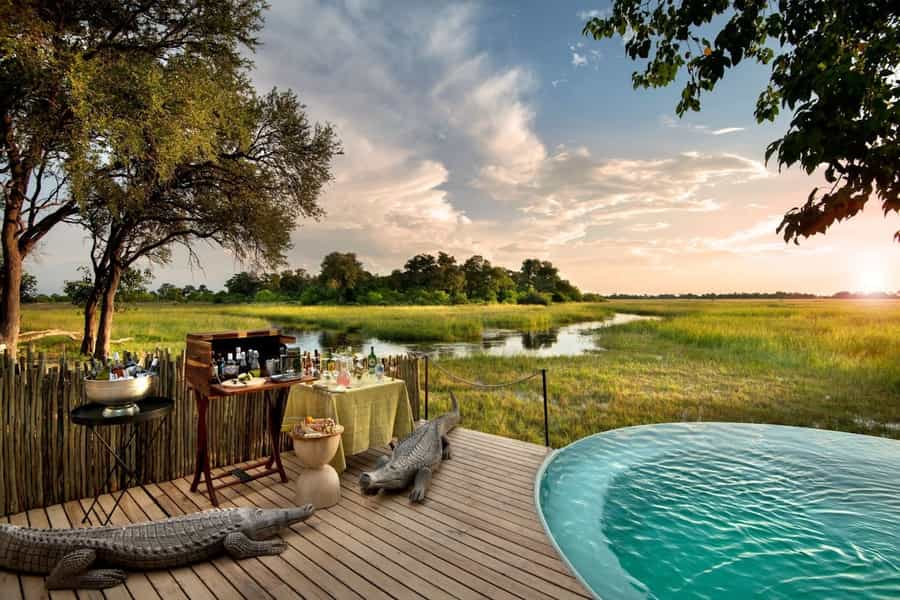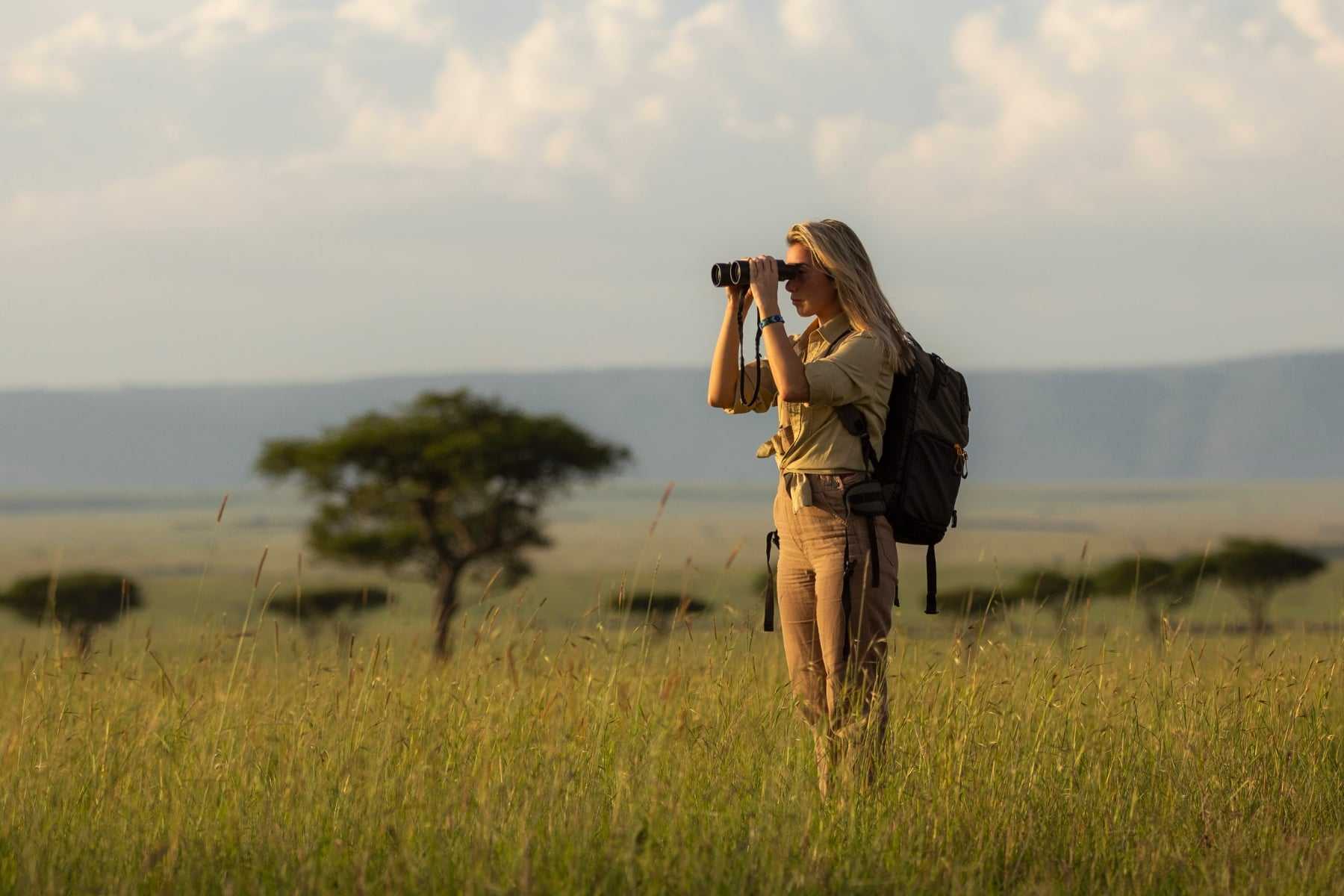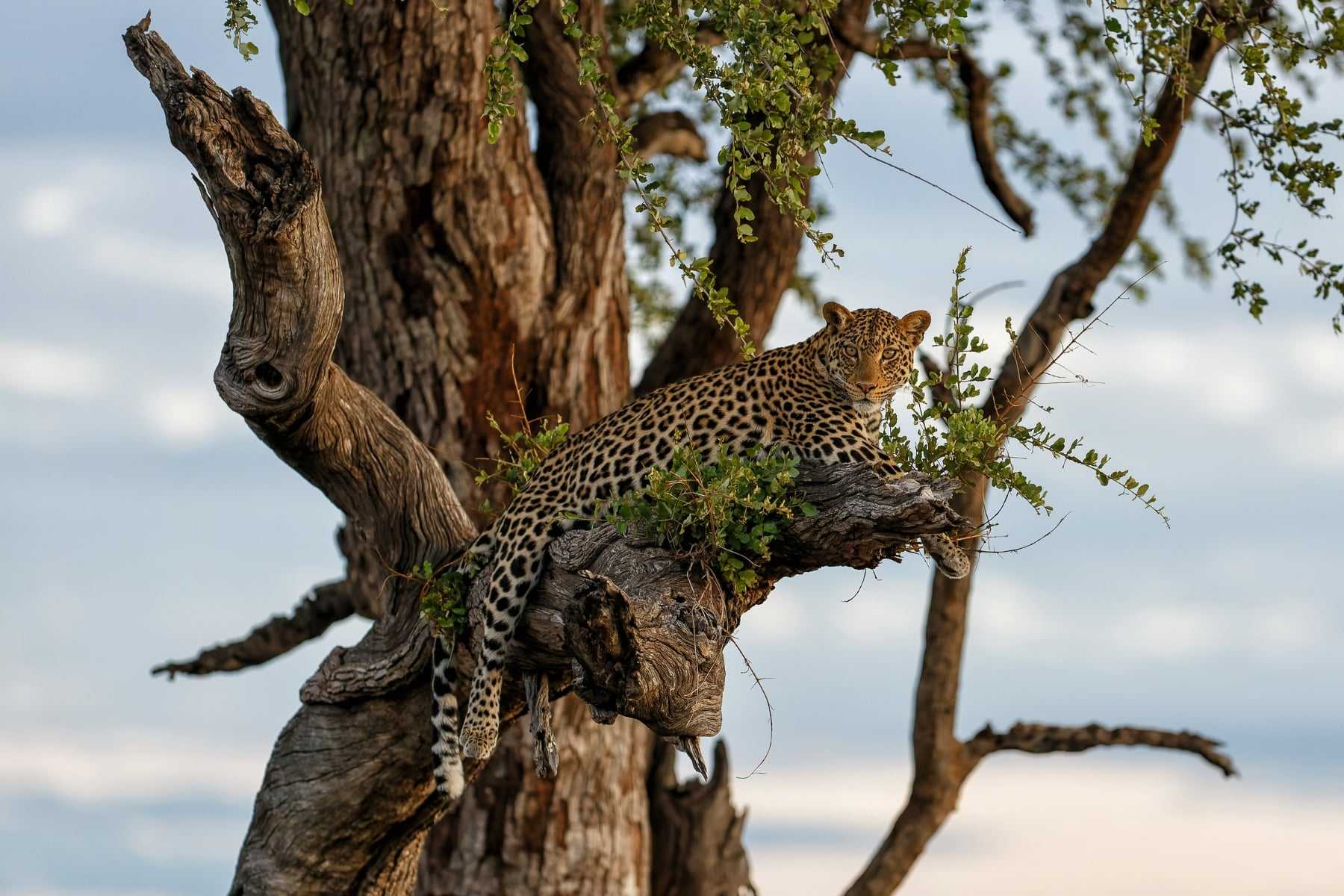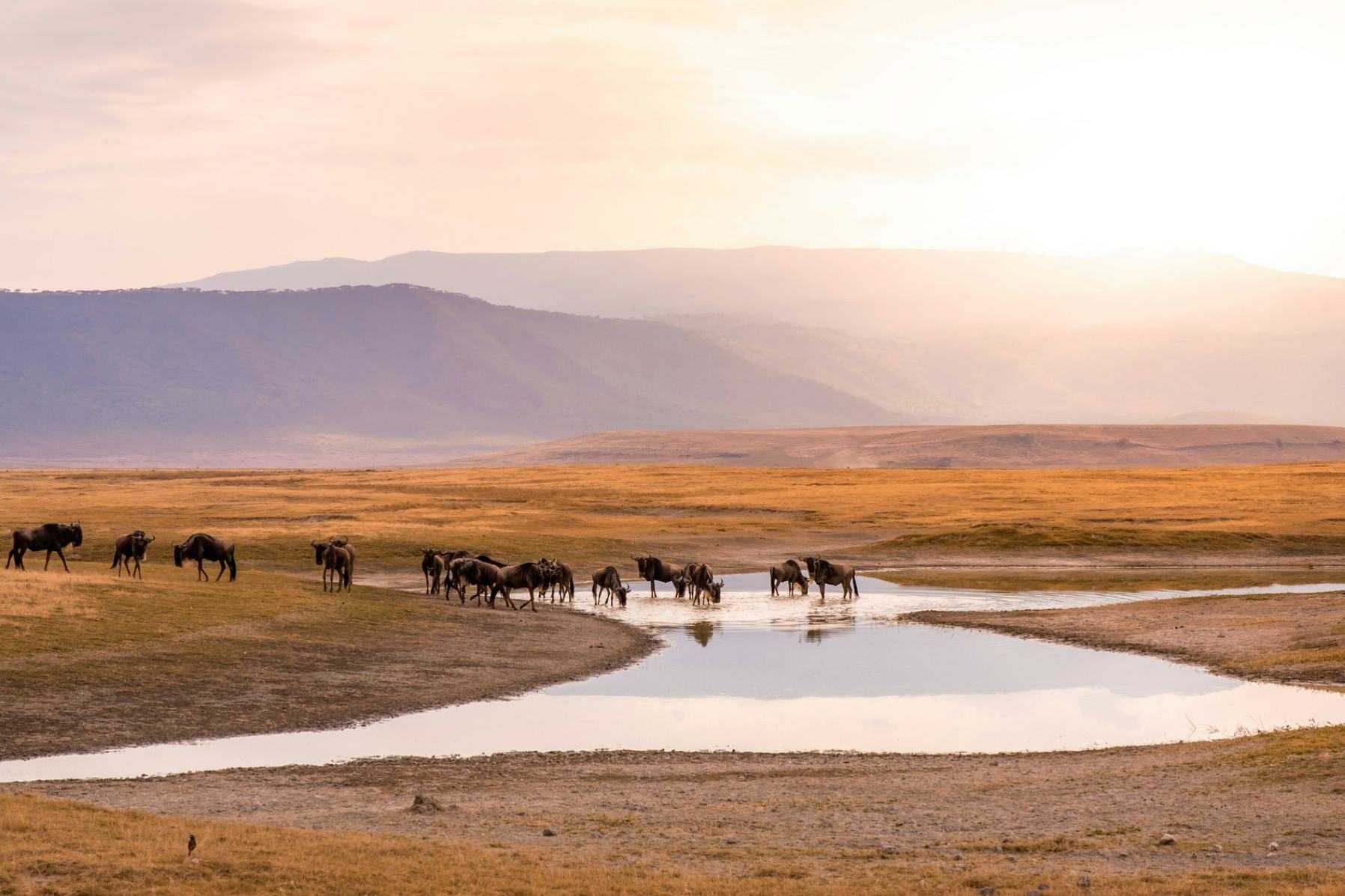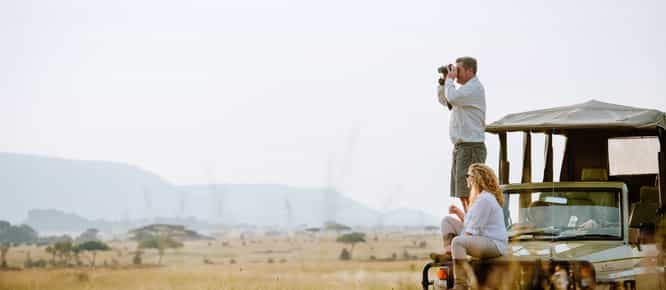When it comes to planning an African safari, Botswana often soars to the top of many bucket lists. Why? It is one of the most prolific wildlife destinations in the world with an abundance of big cats, elephants, and antelope of every kind (more on that later) with dazzling landscapes that range from lunar-like pans to the shimmering Okavango Delta. We could use all the superlatives in the book to describe this unique country, but in this guide we’ll share what you need to know about a Botswana safari, with advice on everything from safety to accommodation types.
In preparation
Budget
Before you pick a destination for your next (or very first!) safari, you will need to decide on what kind of budget you have to work with. In comparison to other countries in southern and East Africa, Botswana is considered to be a fairly expensive destination. On a whole, it emphasises high-value, low-impact tourism, allowing fewer visitors into protected areas in order to minimise the environmental impact. Nearly 40% of Botswana’s land is dedicated to national parks, reserves and wildlife management areas, meaning there are fewer accommodation options for lower budgets. It’s also worth factoring in the transfers from one place to the next, which often requires a small, fixed-wing flight. The time of year also plays a major role in the price of your safari with peak season (July to October) being the most expensive period to visit Botswana. However, there is always a way to reduce costs without compromising on standards – check out our guide here.
Best time to visit
Speaking of which, deciding when to visit Botswana is another very important step in the planning process. The dry season typically takes place between June and October, when you are almost guaranteed to enjoy your safari without a drop of rain. In complete contrast (thanks, nature!), this also constitutes high-water season in the iconic Okavango Delta when wildlife of every shape and size arrives in search of water along with the floods. On the other hand, the green season months of December to March bring lush landscapes as the dust is washed away by rain (although it certainly doesn’t rain every moment of every day), making it an exceptional time for photography – and the birding is indescribable. If you’re looking for some more info on the best time to visit Botswana, read all about it here.
Getting ready
When visiting a foreign country, it’s important to have all your documentation in order including visas. Happily, many countries don’t require a visa to enter Botswana including the USA and UK as well as all citizens of the Commonwealth. If you’re unsure, the full list of countries that require visas can be found here.
It’s also recommended that you consult your personal physician and/or a travel clinic preferably six weeks prior to your departure in order to establish the necessary vaccinations and receive them if need be. Generally, vaccinations that are either required or recommended include Yellow Fever, Typhoid, Hepatitis A and B, and Cholera. It’s important to always carry your International Certificate of Vaccination or Prophylaxis with you. Botswana also has a high malaria risk in the Central and Northern parts of the country, especially during the rainy season and it is recommended that you take the appropriate prophylactics before, during and after your visit.
It’s always best to carry personal identification when travelling including copies of your passport and travel insurance.
What to pack
Many lodges and camps in Botswana are reached via a short flight on a small plane, which come with strict luggage weight limits (usually 15 – 20kg in soft, wheel-less bags). It’s therefore very important to pack lightly and thoughtfully.
Most of your time will be spent on safari, where muted, earthy tones like beige, khaki, olive and light brown are encouraged. It’s best to avoid bright colours and white as they are most obvious to the wildlife. Dark blue and black are also best avoided as they tend to attract tsetse flies. Botswana has strong sun exposure so breathable, lightweight materials like cotton or moisture-wicking fabrics are a go-to, including long-sleeve shirts to protect you from both the sun and insects. If you’re travelling in winter (May to August), opt for layerable items including a jacket or sweater for early mornings and the evening when it can be surprisingly chilly in the bush.
It’s also important to pack closed-toe shoes (one of our top packing tips is to wear them so they don’t take up valuable space and weight in your luggage), a wide-brimmed hat or cap, and sunglasses. In terms of toiletries, it’s important to pack plenty of sunscreen, insect repellent (although most properties supply this) and a basic first aid kit. Most lodges and camps also provide shampoo, conditioners and body wash, but if you would like to, pack small travel-sized versions of your own. For a full guide on what to pack, check out our blog post.
Getting there
Most international travellers opt to fly into Johannesburg and connect to one of Botswana’s main airports via a short regional flight with airlines like Air Botswana, South African Airways or Airlink. Maun is known as the gateway to the Okavango Delta, making it a necessary stop on many Botswana itineraries. You could choose to catch your breath by spending the night there before flying on to your chosen camp or lodge, or catch a charter flight the same day you arrive; both options are popular. If you are visiting northern Botswana, which includes areas like Chobe National Park or Savuti, Kasane Airport is another convenient entry point. It’s also very easy to combine a trip to the north with a sojourn in Victoria Falls and travel directly to Botswana from there.
Is English widely spoken?
English is the official language of Botswana and is spoken by all on-the-ground assistants, guides and lodge staff. However, the most widely spoken language is Setswana (Tswana) and it’s always fun to learn a few phrases like ‘Dumelang’ (hello) or ‘Ke a leboga’ (thank you) to use on your travels. Everyone you meet will be very appreciative!
Once you’re there
Is Botswana safe?
One of the most common questions travellers ask when planning a trip to Africa is, ‘is it safe?’. Happily, Botswana is regarded as one of the safest countries in Africa, offering a stable political climate and low crime rates. And, according to the 2024 Global Peace Index, Botswana is the third most peaceful country on the continent. Of course, petty crime like pickpocketing does occur in urban areas like Maun so it’s best to keep your valuables secure and out of sight. You will likely be accompanied by one of our representatives for most of your time in the country and they will be able to advise you on further safety measures whilst out and about.
The camps and lodges we work with maintain the highest level of security and trust amongst their staff and community and there is no need for safety concerns. However, at most properties there is a safe to lock away any valuables like jewellery, electronics or money – don’t forget to double check nothing is left behind when you leave.
Same-sex relationships have been legal in Botswana since 2019 and while the country is relatively progressive compared to some of its neighbours, travellers should remain mindful of local attitudes whilst in towns or villages.
The guides leading your safari and game drives are trained at the highest level with exceptional knowledge of wildlife behaviour and safety whilst in the bush. They will ensure you are safe and secure at all times, as long as you follow any instructions given.
Getting around
On arrival in Botswana, you will be met by one of our representatives, who will arrange your seamless transfer to your next destination. Depending on where you’re travelling, this may include meeting your guide who will drive you to the next stop on your itinerary or flying with one of the charter flight companies, where you’ll land at the nearest airstrip to your accommodation. For a relatively low fee, you could opt for a helicopter transfer instead, which is an incredible way to see the landscape and wildlife from the air.
Respecting local customs
Greetings are especially important in Botswana and considered a sign of respect, so it’s always best to offer a proper greeting before starting a conversation or asking questions. It’s also important to address the people you meet with their correct titles, especially elders, who you should greet first and address formally. Your guide will always be on hand to help with this. To show respect, it’s best to avoid revealing clothing, especially when visiting a local community. Also, remember to always ask permission before taking photographs of people you come into contact with, particularly during ceremonies.
Money and gratuities
The currency used in Botswana is the Botswana Pula (BWP), which you can withdraw from a bank or ATM, which are widely available in the larger airports and towns. However, it’s useful to carry a variety of bills in US Dollars or British Pounds for tipping and shopping. Whilst gratuities aren’t necessarily customary or compulsory, it is a wonderful way to show your appreciation for a job well done. Take a look at our full tipping guide here.
Types of Botswana safari camps & lodges
In Botswana there is a variety of accommodation types to suit all sorts of preferences, style and budgets. These range from luxury lodges to private, fully-staffed villas or camps, permanent tented safari camps that offer a mixture of high-end and close-to-nature elements, and mobile safari camps that move every few days. No matter what type of property you choose, they all enjoy an impeccably-high standard of service including meals (whether they’re cooked in a kitchen or over an open fire), guiding, and the day-to-day running of activities. There is a run down of our favourite properties in Botswana in this blog.
What wildlife can I see?
Botswana is a country of diverse landscapes from the shimmering waterways of the Okavango Delta to the arid Makgadikgadi Pans, both of which support a varied and diverse range of wildlife. Chief of the wildlife areas is the Okavango Delta, home to enormous herds of elephant, big cats and African painted dogs, and a spectacular array of antelope and birdlife. Chobe is where you’ll find two thirds of Africa’s elephant population as well as huge gatherings of buffalo. For a completely different cast of creatures, head to the Makgadikgadi Pans to spy aardwolf, aardvark and brown hyena, as well as families of meerkats. During the rains, the pans also play host to the zebra of southern Africa’s largest animal migration. And those are just the highlights – read all about Botswana’s incredible wildlife in our blog post.
What activities are on offer?
Throughout Botswana, game drives are a definite favourite, whether you’re splashing across floodplains in your 4×4 or rumbling over dusty pans. Botswana also offers amazing water-based game viewing with mokoro rides in areas like the Okavango Delta and Linyanti, as well as boating safaris on the Chobe River. Walking safaris are available across multiple destinations, where you’ll get to know the landscape in unique ways and enjoy close-up encounters with the wildlife. The Okavango Delta can also be explored on horseback. In destinations like the Makgadikgadi Pans and Central Kalahari, you can even spend time with members of the San tribe. For a real thrill, take in the scenery and wandering animals from the sky on a helicopter flight.
Botswana really is a fantastic destination with so much to offer visitors, from the wondrous wildlife to the fabulous selection of properties. And now that you’re equipped with everything you need to know about a Botswana safari, there’s nothing left to do but start planning.
